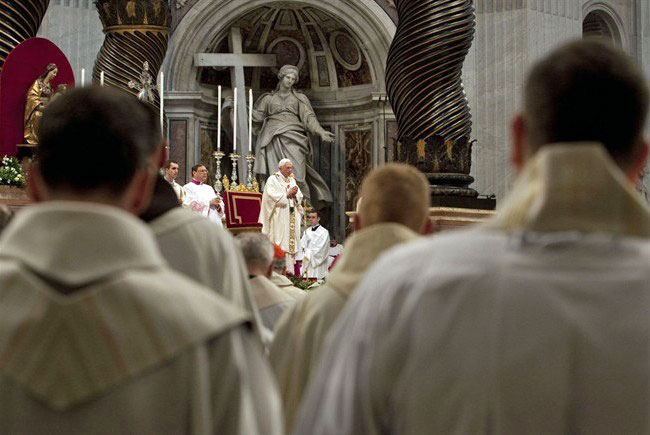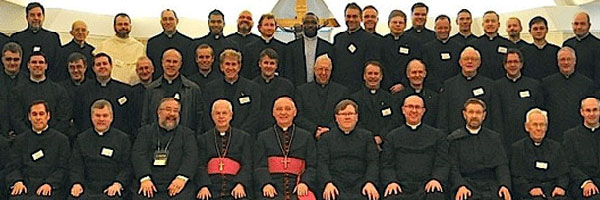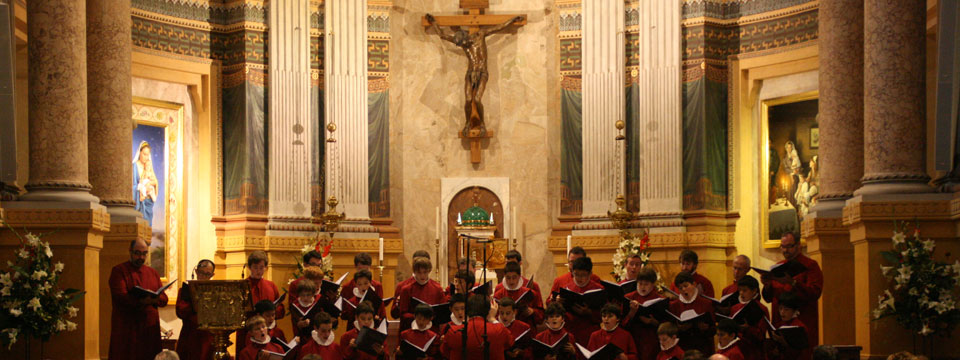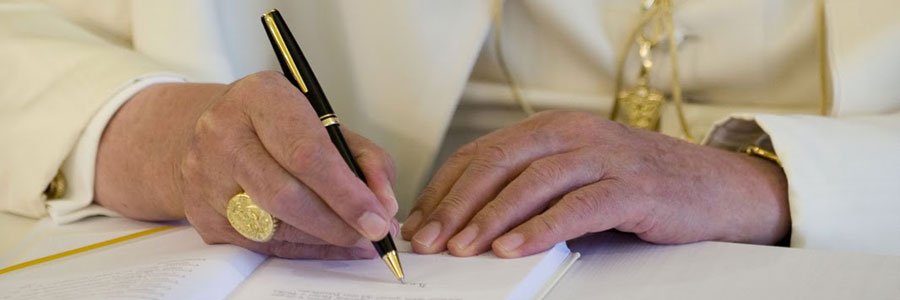As I sit down to pen these remarks, it is the Easter Octave. Most of us at this time are enjoying a break from the intensity of life following the celebration of the Sacred Triduum. The quiet gives one the opportunity to reflect a little more.
In Holy Week, most of us would have gathered with our bishop and local presbyterate to celebrate the Mass of the Holy Chrism. During the course of this celebration we made a “renewal of priestly promises.” It is an occasion to relive the solemn moment of ordination and to rededicate oneself to the Sacred Priesthood. For some, many years have passed since the day of Ordination, for others some years, and for others the sacred chrism is still fresh on the hands. No matter how long in time our sharing in the unique Priesthood of Jesus Christ, our need to recommit and re-examine our hearts as regards our conformity to Christ must be made.
I was moved to ponder the meaning of obedience when I read Pope Benedict’s homily for the Chrism Mass this year. He was very pointed about a crisis that exists amongst some priests in Austria. It also comes against a background of various groupings of priests around the world protesting and rebelling about various matters of doctrine and Church discipline. The Pope stated:
Recently a group of priests from a European country issued a summons to disobedience, and at the same time gave concrete examples of the forms this disobedience might take, even to the point of disregarding definitive decisions of the Church’s Magisterium, such as the question of women’s ordination, for which Blessed Pope John Paul II stated irrevocably that the Church has received no authority from the Lord.
Is disobedience a path of renewal for the Church? We would like to believe that the authors of this summons are motivated by concern for the Church, that they are convinced that the slow pace of institutions has to be overcome by drastic measures, in order to open up new paths and to bring the Church up to date. But is disobedience really a way to do this? Do we sense here anything of that preconfiguration to Christ which is the precondition for all true renewal, or do we merely sense a desperate push to do something to change the Church in accordance with one’s own preferences and ideas?
I would earnestly entreat every priest member of the ACCC to recommit themselves wholeheartedly to “holding the truth in charity.” I would also encourage the need to foster “respect and obedience to their Ordinary.” This will often mean looking beyond clashes of personality or preference that can occur between bishop and priest or amongst priests. The bond that unites is the sacred priesthood and the one faith we profess and teach.
Pope Benedict went on to reflect in his Chrism homily on the meaning of being “stewards of the mysteries” and also to reflect on the phrase from the Chrism liturgy: “zeal for souls.
It is important for bishops, priests and deacons to examine themselves frequently about the manner and depth of our being “stewards of the mysteries.” Pope Benedict has pointed out that from reports received from bishops around the world there is a growing “religious illiteracy found in the midst of our sophisticated society.” We are all aware of the need for intense and systematic catechesis and education in the faith for children, adolescents and adults. In the various dioceses of Australia there has been much effort to reform and revitalise the catechesis of the young. This is continuing with varying results around the country.
The education in faith in our secondary schools still remains one of the areas of greatest need and concern, as priests so often report. The challenge in our schools remains the difficulty to provide a greater number of dedicated, committed and active Catholic men and women as educators in the faith. This reality emphasises the need to form Catholic men and women in the faith. A thorough and systematic catechesis is needed.
As I read Pope Benedict’s reason for calling the “Year of Faith,” I grasp his conviction about the need to teach the faith to our own people. This is our challenge. One of the main reasons why the annual conference of the ACCC is heavily weighted to exploring and deepening areas of doctrine, morals and discipline, is the need for priests to be continually deepening and extending their own theological knowledge and literacy.
The bishops of Australia have called for a “Year of Grace” to be celebrated from Pentecost Sunday this year. The ACCC is responding to this invitation of the bishops and making this the focus of our forthcoming conference at Good Shepherd Seminary, Homebush from June 25th to 29th, 2012. Please make every effort to come to the Conference. The brochure outlining the details and the registration form is included in this copy of The Priest.
The speakers at this year’s conference will include two of our own members who are gifted theologians: Fr Peter Joseph and Fr Scot Armstrong. Bishop Michael Kennedy, newly installed Bishop of Armidale, will be the principal celebrant and homilist at the annual Mass. He will also be guest speaker at the Conference Dinner that will be held at Le Montage Receptions in Leichardt on Tuesday June 26th. It will be our opportunity to extend special congratulations to our new bishop member of the ACCC.
I pray that we will all rededicate ourselves to growing in the virtue of obedience that is the way of true reform and renewal. St John Climacus stated very clearly the danger of disobedience when he wrote:
He who follows his own ideas in opposition to the direction of his superiors needs no devil to tempt him, for he is a devil to himself.
Yours in the Risen Lord!






